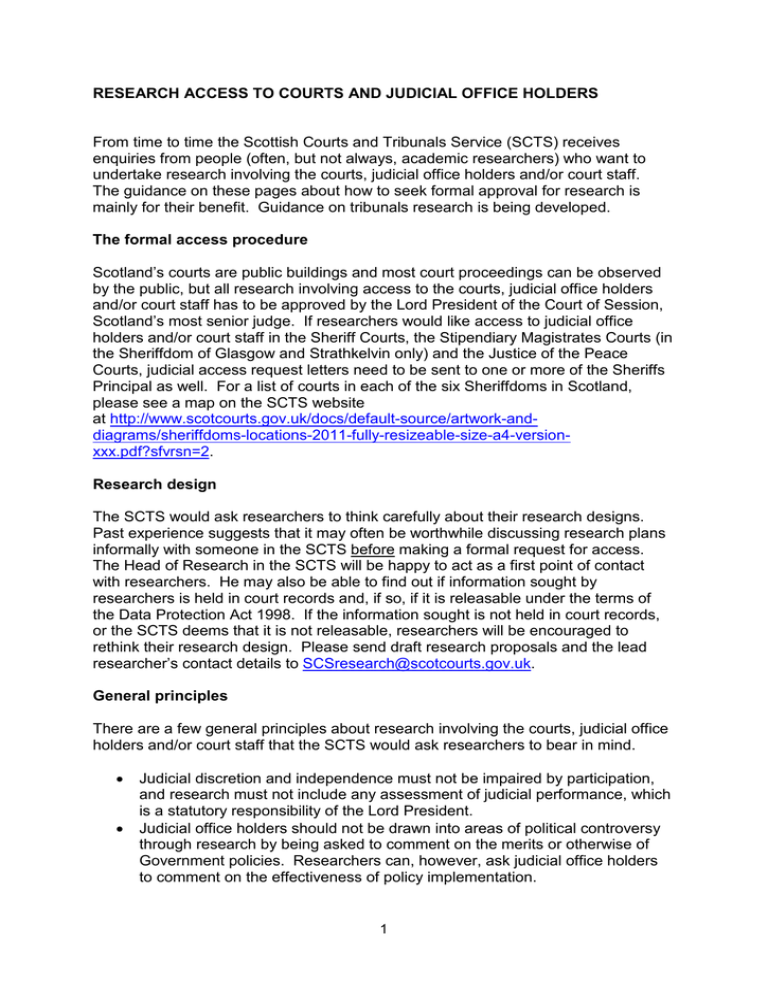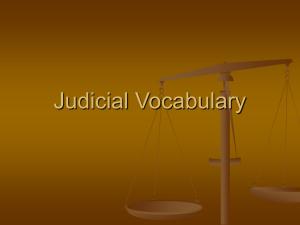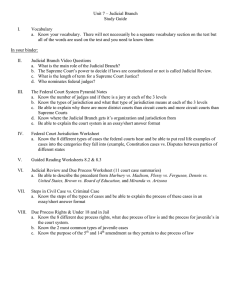RESEARCH ACCESS TO COURTS AND JUDICIAL OFFICE
advertisement

RESEARCH ACCESS TO COURTS AND JUDICIAL OFFICE HOLDERS From time to time the Scottish Courts and Tribunals Service (SCTS) receives enquiries from people (often, but not always, academic researchers) who want to undertake research involving the courts, judicial office holders and/or court staff. The guidance on these pages about how to seek formal approval for research is mainly for their benefit. Guidance on tribunals research is being developed. The formal access procedure Scotland’s courts are public buildings and most court proceedings can be observed by the public, but all research involving access to the courts, judicial office holders and/or court staff has to be approved by the Lord President of the Court of Session, Scotland’s most senior judge. If researchers would like access to judicial office holders and/or court staff in the Sheriff Courts, the Stipendiary Magistrates Courts (in the Sheriffdom of Glasgow and Strathkelvin only) and the Justice of the Peace Courts, judicial access request letters need to be sent to one or more of the Sheriffs Principal as well. For a list of courts in each of the six Sheriffdoms in Scotland, please see a map on the SCTS website at http://www.scotcourts.gov.uk/docs/default-source/artwork-anddiagrams/sheriffdoms-locations-2011-fully-resizeable-size-a4-versionxxx.pdf?sfvrsn=2. Research design The SCTS would ask researchers to think carefully about their research designs. Past experience suggests that it may often be worthwhile discussing research plans informally with someone in the SCTS before making a formal request for access. The Head of Research in the SCTS will be happy to act as a first point of contact with researchers. He may also be able to find out if information sought by researchers is held in court records and, if so, if it is releasable under the terms of the Data Protection Act 1998. If the information sought is not held in court records, or the SCTS deems that it is not releasable, researchers will be encouraged to rethink their research design. Please send draft research proposals and the lead researcher’s contact details to SCSresearch@scotcourts.gov.uk. General principles There are a few general principles about research involving the courts, judicial office holders and/or court staff that the SCTS would ask researchers to bear in mind. • • Judicial discretion and independence must not be impaired by participation, and research must not include any assessment of judicial performance, which is a statutory responsibility of the Lord President. Judicial office holders should not be drawn into areas of political controversy through research by being asked to comment on the merits or otherwise of Government policies. Researchers can, however, ask judicial office holders to comment on the effectiveness of policy implementation. 1 • • • • • The researchers should have the necessary qualifications and experience to conduct the research, although research assistants may be employed under proper supervision. Participation in research should not impose an undue burden on judicial office holders or court staff such as clerks of court (in the Supreme Courts and Sheriff Courts), legal advisors (in the Stipendiary Magistrates and Justice of the Peace Courts) and fines enforcement officers (in the Sheriff Courts). Judicial office holders and court staff who take part in research should not be identified in any reports arising from research. Unless the research involves the evaluation of pilots in one or more courts, individual courts should not be identified in reports arising from the research. Judicial office holders and court staff who take part in research should be sent draft research reports (or relevant parts thereof) before publication so that any errors or misunderstandings on the part of research teams can be identified and raised with the researchers. Some preliminary questions Academic research often requires external funding to be put in place and research plans are often developed before funding is in place. It is for researchers to consider when would be the best time to involve the SCTS in their thinking. Although formal judicial access request letters do not need to be submitted and approved before research funding is approved, researchers are encouraged to think about the detail of their access requirements at an early stage, for example: • Is the subject matter of the research specific to only a few courts, judicial office holders and/or court staff (for example, an evaluation of one or more pilots) or does it have a wider application? If it applies to all courts, the SCTS will need to consider the location of other research in progress in courts so that the burden of research participation in some courts does not become unmanageable. • If the research involves interviews and/or focus groups, where and when could these take place? Court premises may not always have suitable accommodation, and judicial office holders and court staff may be occupied with their duties during the normal hours the court sits (10.00 am to 4.30 pm, or later for those involved with busy custody courts in some areas). At other times, judicial office holders may be dealing with urgent out of hours work or involved in preparation for the next day’s cases, and it is important that researchers when planning research in courts recognise the need to be flexible to accommodate demands on the courts, judicial office holders and court staff. • What kinds of participation in research will judicial office holders and court staff be likely to agree to? Participation may take the form of face to face or telephone interviews, questionnaires, and focus groups. For smaller projects or for those where the involvement of judicial office holders and/or court staff is limited, it may be 2 acceptable to take the views of participants by an exchange of correspondence. Please remember that there is no obligation upon judicial office holders and court staff to discuss their personal backgrounds. • Are there any restrictions on researchers’ activities when observing court proceedings? Observation of proceedings in open court (at which the public is entitled to be present) is allowed and does not need formal prior approval but it is polite, and good practice, for researchers to notify the Sheriff Clerk(s), in advance, of their intention to attend proceedings in Sheriff Courts, the Stipendiary Magistrates’ Court or Justice of the Peace Courts. The Sheriff Clerk(s) will, in turn, inform the presiding Sheriff Principal, Sheriff, Stipendiary Magistrate or Justice(s) of the Peace 1. For observation of proceedings in the High Court, Court of Session or Court of Appeal, researchers should notify the Principal Clerk of Session and Justiciary, who will inform the presiding Judge(s) 2. Judicial permission is required under section 9 of the Contempt of Court Act 1981 if researchers wish to use mechanical recording equipment in court, but researchers are otherwise free to take notes during the course of proceedings. If researchers wish to use a laptop to take notes this should be mentioned in the judicial access request letter. Because of the potential for some laptops to be used for visual and audio recording, this may be approved or rejected on a case by case basis, following consultation with parties to court proceedings. • Can researchers observe proceedings in chambers or in a closed court? Approval for observation of proceedings in chambers will be given by the Judge(s), Sheriff Principal, Sheriff, Stipendiary Magistrate or Justice(s) of the Peace concerned only in exceptional circumstances, and then only with the consent of parties to the proceedings. It is unlikely that approval will be given to observe proceedings in a closed court. • Can researchers obtain access to court records? Access to court records is carefully regulated because they usually contain sensitive or personal information. Court records are exempt from access to information under section 37 of the Freedom of Information (Scotland) Act 2002. The SCTS has a duty not to disclose sensitive or personal information under the terms of the Data Protection Act 1998. Research ethics are also important. As a consequence of the interaction of these regimes it is unlikely that researchers will be allowed to look at, and copy information from, court records. However it is possible that the SCTS may be able to provide some high-level information that will assist researchers, so long as the efforts to locate, extract and summarise the information are not excessive, and this could usefully be explored in informal discussions with the Head of Research. Researchers should also consider if they could instead obtain the information they seek from the originators of documents lodged in the courts, such as the Crown Office and Procurator Fiscal Service or the Association of Directors of Social Work. 1 2 In some Justice of the Peace Courts, Justices sit as a bench of three. In others they sit alone. Judges generally sit alone when hearing criminal trials, civil proofs and bail appeals but in benches of two when hearing appeals against sentence and at least three when hearing other criminal and all civil appeals. 3 Drafting judicial access request letters When it comes to drafting judicial access request letters, researchers should consider the following: • • • Judicial access request letters should be no more than two A4 pages long. These letters should set out clearly the aims and objectives of the research and, in general terms, the extent of the access sought (for example the number and general location of courts to be studied, and the number of judicial office holders and/or court staff the researchers propose to interview). The letters should not nominate individual judicial office holders and/or court staff for participation in research. If research access is approved this will be negotiated by the Lord President and/or Sheriffs Principal who may invite judicial office holders and/or court staff under their jurisdiction to participate. However, it should be noted that no judicial office holder or member of court staff is obliged to participate in research if he or she does not want to. Researchers will be encouraged to send judicial access request letters to the Lord President 3 and relevant Sheriffs Principal. The names and addresses to which these letters should be sent will be given to the lead researcher by the Head of Research. What happens after judicial access request letters have been submitted? Researchers should not approach any courts, any judicial office holder or member of court staff until access has been approved by the Lord President and the relevant Sheriff(s) Principal. If research access is approved, the Lord President and/or Sheriff(s) Principal will reply by letter to the researcher, giving the contact details of a member of court staff with whom they should liaise before making arrangements to conduct their research. It is possible that the Lord President and/or Sheriff(s) Principal may refuse access requests, approve only part of the access requested, seek clarification on issues pertaining to the research before granting approval, ask the researchers to reconsider aspects of their research design before submitting a revised judicial access request letter, or impose conditions relating to the conduct of the research. If research access is not approved, this is usually because the proposed research is considered by the Lord President and/or Sheriff(s) Principal to be likely to have a disruptive impact on courts, judicial office holders and/or court staff. Research funded by the Scottish Government involving access to the courts, judicial office holders and court staff is subject to a similar formal procedure. If researchers are funded by the Scottish Government, judicial access requests will be made by government officials with the assistance of the relevant Analytical Services Team and should not be made independently by the lead researcher. If in doubt, the lead researcher should consult the Scottish Government’s research project manager. 3 For research involving civil courts, access request letters should be addressed to the “Lord President”. For research involving criminal courts, access request letters should be addressed to the “Lord Justice General” (the Lord President’s title when dealing with criminal matters). 4





